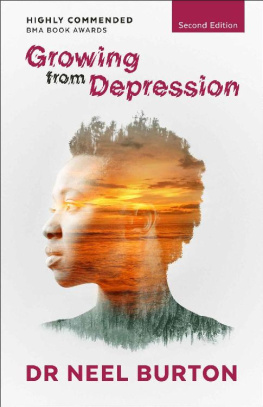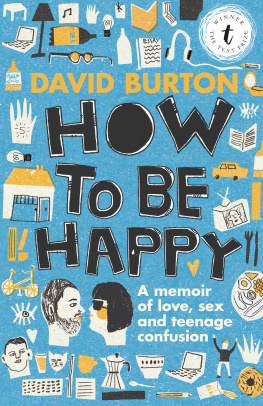Happiness is good for the body, but it is grief which develops the strengths of the mind.
All rights reserved.
No part of this book may be reproduced in any form or by any electronic or mechanical means, including information storage and retrieval systems, without written permission from the author, except for the use of brief quotations in a book review.
Dr Neel Burton is a psychiatrist, philosopher, and wine-lover who lives and teaches in Oxford, England. He is a Fellow of Green-Templeton College in the University of Oxford, and the winner of several book prizes including, the feather in his cap, a Best in the World Gourmand Award. His work features regularly in the likes of Aeon and Psychology Today and has been translated into several languages. When he is not reading or writing, or imbibing, he enjoys cooking, gardening, skiing, learning languages, visiting museums and gardens, and travelling, especially to sunny wine regions.
www.neelburton.com
 Facebook
Facebook
 Twitter
Twitter
 BookBub
BookBub
 Goodreads
Goodreads
 Amazon
Amazon
Also by Neel Burton
The Meaning of Madness
Hide and Seek: The Psychology of Self-Deception
Heaven and Hell: The Psychology of the Emotions
For Better For Worse: Essays on Sex, Love, Marriage, and More
Hypersanity: Thinking Beyond Thinking
The Art of Failure: The Anti Self-Help Guide
Growing from Depressionrather than Recovering from Depression or maybe Defeating Depressionis a counterintuitive, perhaps even provocative, title for a book on depression.
I chose it for what I think are three very good reasons:
- First, I wanted to challenge the popular perception of people with depression. Rather than being failures or losers, they are often, as I will argue, among the most honest, intelligent, and sensitive of all people.
- Second, while I would never wish it on anyone, depression can challenge us to identify and address long-standing life problems, potentially opening us out onto a much brighter future.
- Third, and perhaps most obviously, the journey out of depression is one of learning: learning about oneself, of course, but also learning life skills such as managing stress and coping with bad news, and, above all, learning to rediscover the little things that make life worth living and loving.
In emphasizing as I do the good that come from depression, I hope to encourage and empower you to tackle the feelings of hopelessness and helplessness that are the core of the conditionand, like the Baron Munchausen, pull yourself out of the swamp by your own bootstraps.
As poor concentration and motivation are common features of depression, I have tried to be as concise and efficient as possible. I have divided the self-help section into short, self-contained modules, enabling you dip in and out of the book and focus on whatever seems most interesting or useful.
If you are struggling to read, you can leave out Chapters 1 to 7 and come back to them when you are feeling better.
I wish you the very best on your quest.
* * *
All that is gold does not glitter,
Not all those who wander are lost;
The old that is strong does not wither,
Deep roots are not reached by the frost.
From the ashes a fire shall be woken,
A light from the shadows shall spring;
Renewed shall be blade that was broken,
The crownless again shall be king.
JRR Tolkien, The Fellowship of the Ring
10 simple ways to lift your mood
Before getting down to the nuts and bolts of depression, here are some simple things that anyone can do to lift their mood.
You may already be doing some of these things, and you certainly dont need to be doing them all. Just try the ones that feel most comfortable, or that are easiest for you.
As your mood begins to liftand sooner or later it certainly willyou can make more and bigger changes to your routine.
And if you can hold on to those habits once your mood has lifted, you may well feel better than you ever have before.
1. Spend more time with sympathetic friends and relatives. So long as they are receptive, talking to others about our feelings helps us to process them, put them into perspective, and obtain advice and support. Dont be afraid to tell people that you need their time, or feel guilty for taking it. If you are uncomfortable talking to relatives and friends, or are unable to do so, you can phone a helpline instead. Even if you dont want to talk about your feelings, spending time with others, for example, playing sports or cooking a meal, should help to lift your mood.
2. Dont bite off more than you can chew. Try to reduce your levels of stress. Simplify your life, even if it means doing less or doing only one thing at a time. Break down large tasks into smaller ones and set realistic deadlines for completing them. Dont blame yourself for doing nothing, you are merely giving yourself the time and space that you need to get better. Just think of it as taking a step back to jump further.
3. Do more of the things you normally enjoy, even if they no longer seem appealing. Read your favourite childhood book, go shopping or to the cinema, prepare a meal, spend time with an old friendanything that gets you out and takes your mind off negative thoughts is likely to make things that much better.
4. Get out of your home at least once a day, even if only to buy milk or walk in the park. Bright daylight, fresh air, and the hustle bustle of everyday life can all be helpful, as can the sights, sounds, and smells of nature. If you can, try to take some mild exercise such as a 30-minute walkideally, through some greenery, on a stretch of coastline, or past some beautiful buildings.









 Created with Vellum
Created with Vellum

 Facebook
Facebook Twitter
Twitter BookBub
BookBub Goodreads
Goodreads Amazon
Amazon


